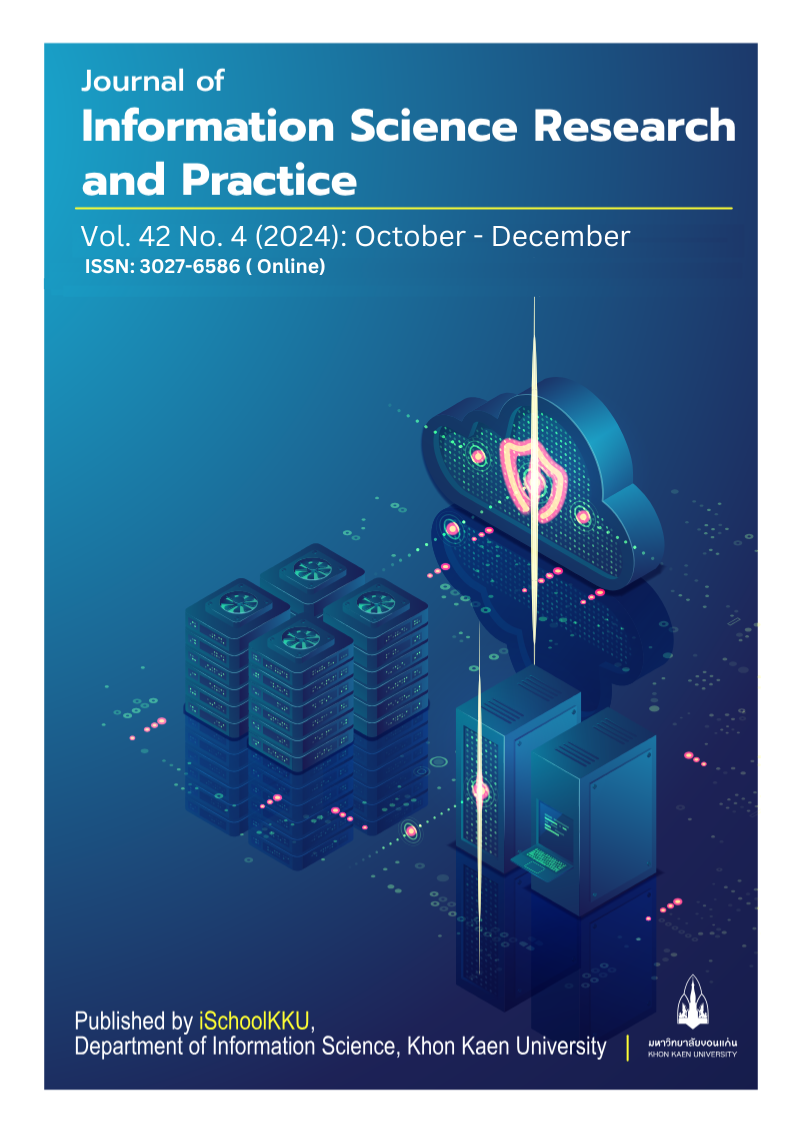Competencies in Tackling with Fake News According to Opinions of Librarians at Leading Higher Education Institutions in Thailand
DOI:
https://doi.org/10.14456/jiskku.2024.26Keywords:
Fake news on social media, Higher education institution librarian, Library, Librarian competencyAbstract
Purpose: To study the opinions on the competence of librarians at leading higher education institutions in Thailand in tackling fake news on social media.
Methodology: This study employs a quantitative research method using a questionnaire as the data collection tool. Data were collected from a population of 267 individuals, consisting of librarians from leading higher education institutions in Thailand, including the following 14 institutions: Chulalongkorn University, Mahidol University, Chiang Mai University, Thammasat University, Kasetsart University, Prince of Songkla University, Khon Kaen University, King Mongkut's University of Technology Thonburi, King Mongkut's University of Technology North Bangkok, King Mongkut's Institute of Technology Ladkrabang, Naresuan University, Silpakorn University, Suranaree University of Technology, and Walailak University.
Findings: Librarians consistently prioritize personal qualities and skills in dealing with fake news equally as the top priority, followed closely by knowledge in handling fake news.
Application of this study: The results of this study can serve as a guideline for higher education administrators to develop strategies for enhancing the librarians’ competency in dealing with fake news on social media. It also provides a framework for librarians to further develop their skills in managing fake news on social media.
Downloads
References
Alvarez, B. (2017). Public libraries in the age of fake news. Retrieved from http://publiclibrariesonline.org/2017/01/feature-public-libraries-in-the-age-of-fake-news/
Buranadechachai, S. (2017). Not sure...a turbulent society. Retrieved from http://imgs.mcot.net/images/2018/05/1525684457247.pdf.
Chaisuwann, B. (2023). Criteria for examining fake news in health. Rampaipanni Research Journal, 17(1), 72-82.
Effron, D. A., Kim, M., Lazer, D., & Rand, D. (2019). Fake News and Misinformation: Problems and Solutions. Academy of Management Proceedings, 2019(1), 12345. https://doi.org/10.5465/ambpp.2019.12345symposium
Kwiecien, K., Hoaihongthong, S., Chitiyaphol, J., Phrompan, I., & Cheounchom, S. (2022). The Competency of Teacher Librarians for Providing School Library Services Smart. Journal of Information Science, 40(2), 116–133. https://doi.org/10.14456/jiskku.2022.13
Leenaraj, B. (2011). Roles of the Research University Library in Supporting the University’s Research. Information Journal, 29(2), 73-86.
Maitaowthong, T. (2018). Information literacy skills for 21st century learning. Humanities and Social Sciences Academic Journal, 6(2), 179-190.
Mamataha, S., et al. (2017). Information usage behavior of students at the library and Information technology service unit of universities in the southern border provinces. Proceedings of the 4th National Conference, (1-6). Phetchabun: Phetchabun Rajabhat University
Ministry of Digital Economy and Society. (2020). Anti-fake news center Thailand. Retrieved from https://www.antifakenewscenter.com
Ngamcachonkulkid, W. (2022). Fake News with Fomo in Thai Gen Z. Retrieved from http://dspace.spu.ac.th/handle/123456789/7965
Panumaporn, J., Soisudarat, C., & Meechanphet, V. (2014). Development of learning program to enhance critical thinking skills based on Bloom’s theory in advertising media consumption. Bangkok: Chulalongkorn University.
Phluemwong, N. (2023). Participation in combating fake news by community network: A case study of the New Lifestyles Fake News Watch Network. Journal of Educational Innovation and Research, 7(1), 247-259.
Promwong, N. (2011). Guidelines for promoting the development of desired professional competencies of librarians in the digital age at Rajamangala University of Technology Isan. Graduate Journal, 16(73), 203-215.
Promwong, N. (2018). Guidelines for promoting the development of desired professional competencies of librarians in the digital era. (In Thai). Master's thesis in Information Science and Technology, Rajamangala University of Technology Isan.
Renda, A. (2018). The legal framework to address “fake news”: possible policy actions at the EU level. ฺBrussels: European Parliament.
Runkham, M. (2001). Effects of using critical thinking development model on problem-solving abilities in community context of mathayomsuksa three students. Master thesis in Education in Educational Psychology, Faculty of Education, Chulalongkorn University.
Santi, R. (2022). Digital literacy competencies for librarians in Thai research university libraries. Information Journal, 29(1), 131-154.
Smithikrai, C. (2012). Recruitment, selection, and performance evaluation of personnel. (In Thai). 4th ed. Bangkok: Chulalongkorn University Press.
Sukruay, T. (2015). Competencies of information professionals in providing research support services in Thai research university libraries. (In Thai). Master’s thesis in Library and Information Science, Faculty of Humanities, Chiang Mai University.
Thachit, P. (2020). The Development of competencies for librarians in the 21st century: Case study of Ubon Ratchathani University. Proceedings of the 10th National Conference. Songkla: Thaksin University
Thai Training Zone. (2020). Service mind. Retrieved from http://www.thaitrainingzone.com/training/detail/ServiceMind-ServiceMind_11444.html








